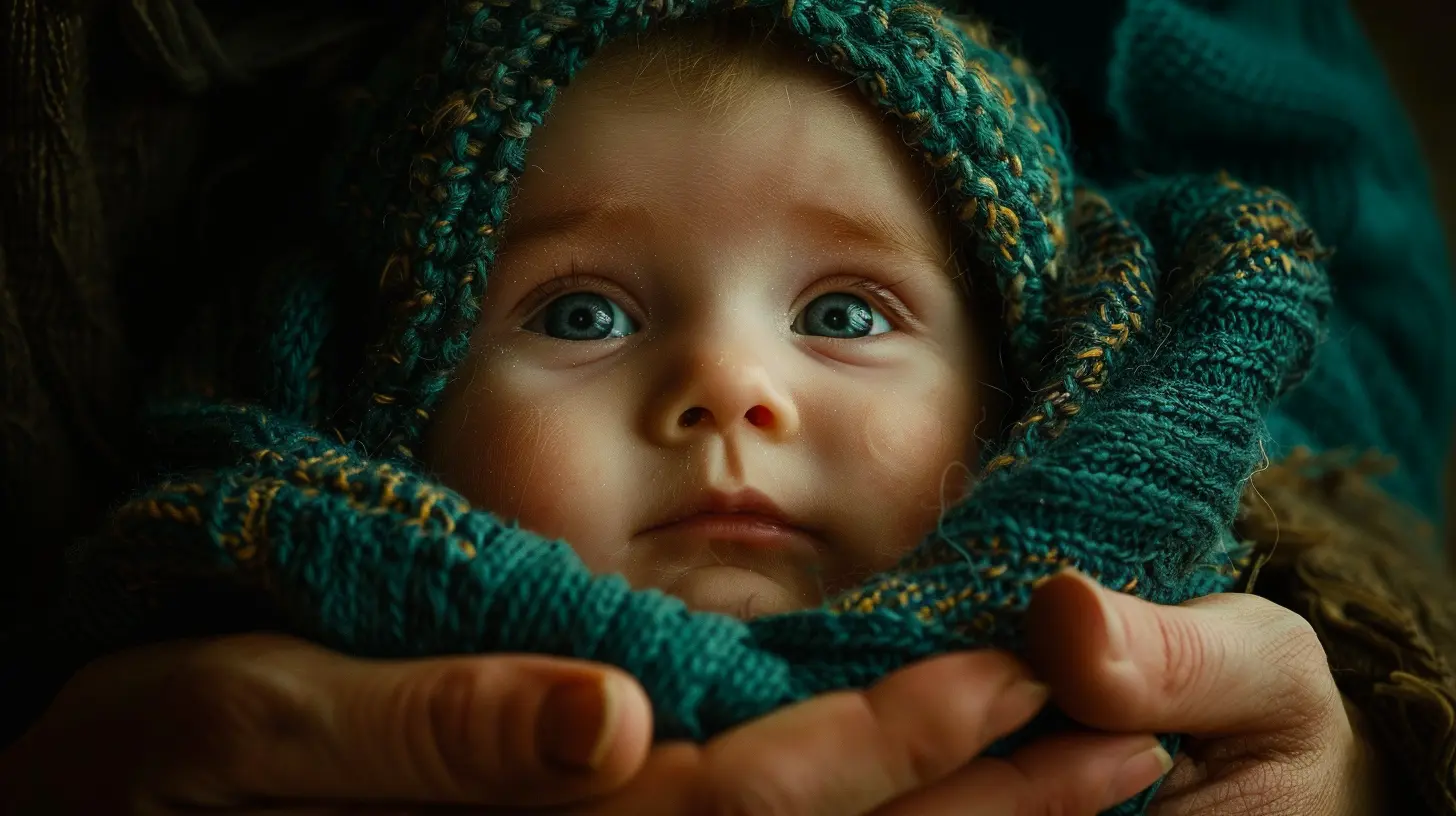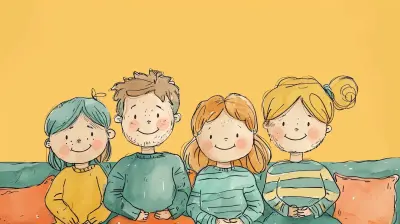Breaking Down Adoption Myths: What Every Parent Should Know
31 December 2024
Adoption is a beautiful journey that provides a unique opportunity for families to grow in unexpected and meaningful ways. However, despite its heartwarming potential, adoption is often surrounded by a cloud of misconceptions and myths that can leave prospective parents feeling overwhelmed or unsure about their decision. If you're considering adoption or simply trying to understand it better, it’s crucial to separate fact from fiction.
In this article, we’ll break down some of the most common myths about adoption, clarify the truth behind them, and hopefully provide you with some peace of mind.

Adoption Myth #1: Adoption is Only for Couples Who Cannot Have Biological Children
One of the most pervasive myths floating about is that adoption is only an option for couples who are unable to conceive biologically. This simply isn't true. While it’s absolutely valid if infertility leads someone to explore adoption, it's not the sole reason families choose adoption.Many adoptive parents feel called to adoption purely because they want to open their hearts and homes to a child in need. Some people choose to adopt because they’re passionate about providing a stable home to children from foster care or from overseas.
The Truth:
Adoption is for everyone—individuals, couples, families with biological children, and families without. The underlying commonality? A desire to parent and provide love. That’s all that truly matters.
Adoption Myth #2: The Biological Parents Will Always Try to Reclaim Their Child
One of the bigger worries for prospective adoptive parents is the fear that the biological parents will eventually attempt to "take back" the child. Movies and TV shows often amplify this fear, showing biological parents showing up out of nowhere to disrupt the lives of adoptive families. It makes for good drama in Hollywood, no doubt, but is it reality?The Truth:
In real life, once parental rights are terminated (a legal process that happens during adoption), the biological parents cannot simply “come back” and reclaim custody. Yes, open adoptions may involve ongoing contact with the birth parents, but this is a mutual decision made by both parties before the adoption takes place.Adoption agencies and legal systems work hard to ensure that families have peace of mind and security in their adoption. So, rest easy—there aren’t any unexpected knock-on-the-door situations to worry about.

Adoption Myth #3: Adopted Children Will Always Struggle with Their Identity
There is this lingering belief that adopted children are destined to deal with identity struggles or emotional problems for the rest of their lives. While it’s normal for any child—adopted or not—to experience moments of self-reflection as they grow, to say that every adopted child will face a lifelong battle with their identity is an unfair generalization.The Truth:
Healthy, loving environments can help a child thrive, regardless of whether they’re adopted or biological. If children know they’re loved, supported, and raised with open communication, they’re more likely to feel secure in their identity.In fact, many adoptive parents report that talking openly about adoption from an early age fosters a stronger sense of identity in their children. It’s the way adoption is handled, rather than the mere fact of adoption itself, that makes the biggest difference.

Adoption Myth #4: Only Babies Are Available for Adoption
When most people picture adoption, they envision a couple adopting an infant straight from the hospital. This picture-perfect, newborn adoption scenario is often what’s shown in media portrayals, leading to the widespread myth that only babies are available for adoption.The Truth:
While infant adoption is certainly an option, it’s far from the only one. In fact, many children waiting for adoption are older, and thousands of children in the foster care system are in need of permanent homes.These older children may range anywhere from toddlers to teenagers, and while their needs might differ from those of a newborn, their ability to bring joy and love into a family is just the same. Older-child adoption can be equally rewarding and is a great choice for parents who are ready to give a stable, nurturing environment to kids who may have had a rough start.
Adoption Myth #5: Adoption is Too Expensive for the Average Family
It’s no secret that certain types of adoption can get pricey. International adoptions and private adoptions can involve streams of paperwork, agency fees, and travel costs. But is it true that adoption is always expensive and out of reach for the average family?The Truth:
Adoption can be affordable, depending on the route you choose. Adopting through foster care, for example, typically has minimal costs, and in many cases, the state covers legal fees. Additionally, there are plenty of grants, tax credits, and subsidies available for prospective adoptive parents to help ease the financial burden.Before you give up on the idea, research the various types of adoption and explore the financial assistance that could be available to you. Many families find they’re able to bring a child into their home without devastating their bank account.
Adoption Myth #6: Adoption Takes Forever
We’ve all heard horror stories about adoption processes dragging on for years and years. Some people believe the endless wait times apply to all forms of adoption, creating another deterrent for prospective parents. But does it really take that long?The Truth:
The timeline for adoption varies depending on the type of adoption you pursue. Domestic infant adoptions may take anywhere from several months to a few years, primarily due to the matching process and any legal proceedings required. However, foster care adoptions often take less time, especially if the child is already legally free for adoption.International adoptions can sometimes take longer due to country-specific regulations and bureaucracies. However, working with a reputable adoption agency can help streamline the process.
At the end of the day, while some adoptions certainly require patience, many families experience a relatively swift process depending on their specific circumstances. As with anything worthwhile, diligence pays off.
Adoption Myth #7: It’s Hard to Love an Adopted Child as Much as a Biological One
This is one of the most harmful myths out there. Prospective adoptive parents may fear that they won’t be able to bond with an adopted child in the same way they might with a biological one, and it can create doubt about their readiness for adoption.The Truth:
Love doesn’t come from genetics—it comes from the heart. Once a child enters your life, whether through birth or adoption, they become your child. Many adoptive parents will tell you that they experience the same deep, emotional connection with their adopted child as they do with biological children.The bond between a parent and a child isn’t predetermined by biology but by the nurturing and love you give them. Adoptive parents are just as capable of forming lifelong, unbreakable bonds with their children.
Adoption Myth #8: Siblings Need to Be Kept Together, Even When One Child Has Special Needs
Many people believe that if they adopt one child, they are obligated to adopt their siblings too. Or, in some cases, they worry they have to take on a sibling with significant special needs if they’re adopting a more traditional case.The Truth:
While sibling adoptions are encouraged in some cases, agencies understand that every family has its capacity. If you decide that adopting a sibling group isn’t right for you, there are no forced adoptions. Similarly, if a child has special needs that your family is not prepared to handle, it is okay to express those concerns.The goal of adoption agencies is to find the best match for both the child and the adoptive family. It’s never about putting pressure on parents to take on more than they can manage.
Adoption Myth #9: You Have to Go Through an Agency
Another myth that surrounds adoption is that you can only adopt a child by going through an expensive and time-consuming adoption agency. While agencies do help make the process smoother, they’re not the only path to adoption.The Truth:
Private adoptions (directly between birth parents and adoptive parents) are also a valid and commonly used option. Independent adoptions are often arranged with the help of attorneys and consultants who specialize in adoption law. Similarly, foster-to-adopt programs don’t usually involve private agencies, as they work through the state.Each adoption route has its pros and cons, but either way, there are various options that fit different personal preferences and circumstances.
Conclusion: Adoption is About Love, Not Myths
Adoption is one of the most loving and fulfilling ways to grow a family. But like any important decision, it must be approached with clear facts and an open heart. By debunking these adoption myths, we hope to have shed light on the realities of adoption and provided clarity on what prospective parents can actually expect.It’s always important to stay informed, maintain an open mind, and trust that, no matter the route you take, adoption is a beautiful path full of love, growth, and joy. Don’t let myths deter you from exploring this incredible journey. The truth is, with the right preparation and support, adoption can be one of the most life-changing experiences for both you and your future child.
all images in this post were generated using AI tools
Category:
AdoptionAuthor:

Karen Hurst
Discussion
rate this article
14 comments
Vivian Shaffer
Essential insights for informed parenting!
February 8, 2025 at 4:29 AM

Karen Hurst
Thank you! I'm glad you found the insights valuable for informed parenting.
Felix Adams
Adoption is a beautiful journey, filled with love and connection. By breaking down myths, we empower ourselves to embrace and celebrate diverse families. Let's champion understanding and acceptance, ensuring every child's story is honored and every parent's heart is filled with pride. Together, we can change perceptions!
January 30, 2025 at 3:47 PM

Karen Hurst
Thank you for your thoughtful comment! I completely agree—embracing diverse families and breaking down myths is essential in fostering understanding and pride in the adoption journey.
Bethany McFarlane
Adoption is often misunderstood. It’s crucial for prospective parents to educate themselves on common myths regarding adoption. By breaking down these misconceptions, we can foster a more compassionate understanding of the adoption process, its challenges, and the incredible families it creates. Knowledge is essential.
January 27, 2025 at 4:54 PM

Karen Hurst
Thank you for highlighting the importance of education in understanding adoption. Addressing myths is vital for creating compassionate perspectives and supporting families through the journey.
Valeris McGlynn
This article brilliantly dispels common adoption myths, fostering understanding and compassion. By shedding light on the realities of adoption, it empowers current and prospective parents to embrace the journey with open hearts and informed minds, ultimately enriching the lives of both children and families.
January 25, 2025 at 5:11 AM

Karen Hurst
Thank you for your thoughtful feedback! I'm glad to hear the article resonated with you and helped clarify important aspects of adoption.
Alvin Roth
Thank you for shedding light on adoption myths in such an informative way. This article is a valuable resource for parents, helping to foster understanding and empathy. It’s essential that we promote accurate narratives surrounding adoption for the benefit of all families.
January 21, 2025 at 4:07 PM

Karen Hurst
Thank you for your kind words! I'm glad you found the article informative and helpful in promoting understanding around adoption.
Luella McElveen
This article does a fantastic job of debunking common adoption myths! Understanding the realities of adoption is crucial for all parents, whether considering it or supporting others on that journey. Knowledge fosters compassion and acceptance—key ingredients for a loving family. Highly recommend reading!
January 17, 2025 at 4:00 AM

Karen Hurst
Thank you for your thoughtful feedback! I'm glad you found the article helpful in fostering understanding and compassion around adoption.
Garrett Acevedo
Adoption is a beautiful journey, not a backup plan. Embracing the unique stories of adopted children enriches our families and communities. By understanding and dismantling myths, we empower ourselves and others—creating a more inclusive and compassionate world for all families. Let's celebrate adoption together!
January 11, 2025 at 3:38 AM

Karen Hurst
Thank you for your insightful comment! I completely agree—celebrating adoption and embracing its unique stories truly enriches our families and communities. Let's continue to empower and uplift each other in this journey!
Zeno Willis
Great insights! Understanding adoption helps build a loving, supportive family environment.
January 5, 2025 at 5:13 AM

Karen Hurst
Thank you! I'm glad you found the insights helpful. Building a supportive family environment is crucial in the adoption journey.
Vesperos Klein
Embrace the journey of adoption with an open heart! Unraveling myths empowers all families to celebrate love, connection, and the beauty of chosen bonds.
January 3, 2025 at 5:36 PM

Karen Hurst
Thank you for your insightful comment! Embracing the journey of adoption truly enriches families and strengthens the bonds of love.
Elijah Vaughn
This article beautifully addresses common misconceptions about adoption. By fostering understanding and empathy, it empowers parents to support adopted children. Open conversations about these myths can truly enrich family dynamics. Great resource!
January 3, 2025 at 5:48 AM

Karen Hurst
Thank you for your kind words! I'm glad you found the article helpful in promoting understanding and open conversations about adoption.
Runevale Sullivan
Thank you for shedding light on the complexities of adoption. Your insights are invaluable for both adoptive parents and those considering adoption. By debunking these myths, we foster a more understanding and supportive community, ensuring every child's story is honored and celebrated.
January 2, 2025 at 3:26 PM

Karen Hurst
Thank you for your thoughtful feedback! I'm glad the article resonated with you and contributes to a more supportive understanding of adoption.
Upton Patel
Insightful insights for informed parenting decisions!
January 2, 2025 at 4:17 AM

Karen Hurst
Thank you! I'm glad you found the insights helpful for informed parenting.
Danica Hall
This article beautifully clarifies common misconceptions about adoption. It’s crucial for all parents to understand the unique journey it offers. Knowledge empowers us to support and celebrate every family’s story!
January 1, 2025 at 4:31 AM

Karen Hurst
Thank you for your kind words! I'm glad the article resonated with you and highlights the importance of understanding adoption.
Camden Lamb
Adoption myths are like fruitcake at the holidays—everyone pretends they love it, but nobody actually wants to deal with the leftovers! Let’s unwrap the truth and celebrate the unique beauty of adoption, one myth-busting slice at a time!" 🍰❤️
December 31, 2024 at 4:57 PM

Karen Hurst
Absolutely! Let’s slice through the myths and reveal the beautiful realities of adoption together. 🍰❤️
MORE POSTS

Helping Kids Navigate Changing Family Roles

The Secret to Time Management Lies in Your Evening Routine

Building a Homework Routine That Sticks

Airbnb vs. Hotel: Which is Better for Family Vacations?

Introducing Your Kids to Photography: Fun Outdoor Projects

Declutter Your Calendar: How to Avoid Overcommitting as a Parent

Navigating Long-Distance Co-Parenting in Blended Families

Fostering Creativity in Toddlers Through Art and Music

How to Handle Sibling Rivalry Without Always Playing Referee